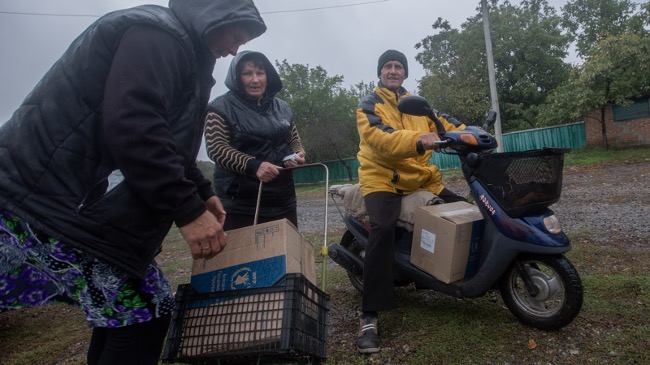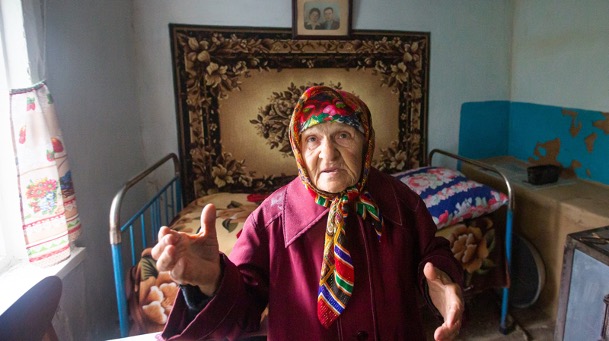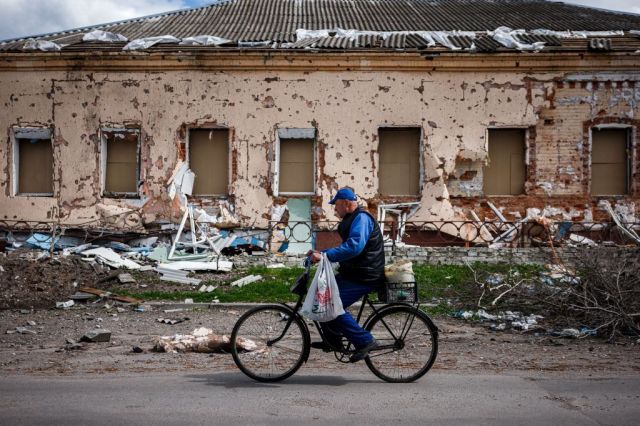A man rides past a destroyed house in the village of Derhachi north of Kharkiv (DIMITAR DILKOFF/AFP via Getty Images)

Ukrainian villages hold a special place in the region’s collective imagination. Nikolai Gogol, one of Russian Empire’s foundational authors, established them as a favourite place of demons, witches and the undead. Today, they remain a haven for magical realism and folkloric rites, echoing throughout contemporary Ukrainian literature and war propaganda alike.
When I hitch a ride to the newly liberated villages east of Kharkiv — now the target of Putin’s latest offensive — my companions are surprisingly upbeat. Our driver, Sergey, is from Saltivka, a suburb of Kharkiv most destroyed by the war. “This is a special territory,” another passenger jokes, “you can listen to songs in Russian on the radio.” He puts on a scratched CD and the car is filled with raspy Russian prison chanson.
Beyond the reach of Ukraine’s cities, this is a land that lives by its own rules. Mud and road signs are painted over to confuse Russian forces. Out of the fog emerges a checkpoint with a silhouette of a soldier. Once we drive closer, we see that the soldier isn’t human — it’s a mannequin in a soaked uniform. A human soldier is already approaching, he glances at the “VOLUNTEERS” sign on our car and waves us through.
Normally, during the summer months, these villages play host to “Dacha season”, when the nation’s young families escape the cities while school is out. Perhaps this connection to childhood was what made villages feel so safe when Putin’s forces invaded in 2022. As Timothy Snyder has observed, many Ukrainians initially fled to villages as they instinctively seemed safer than cities.
They were wrong. Undefended, villages bore the brunt of the first months of occupation. In Kharkiv, the Russian Army came from the northeast, subduing Izium, Liman, and finally reaching Kharkiv itself. In October 2022, the Russians were swiftly driven out of the Kharkiv region. Only rusty burnt armour, torture rooms, and cold fog remained.
Once again under Kyiv’s control, many villages remained neglected, like they were for decades. Before the invasion, the village was already dying, succumbing to global urbanisation, inequality, and poverty. As the BBC reported 12 years ago, “none of the government programmes aimed at solving the situation has yet produced real results”. Not much has changed — according to 2021 data, dozens of villages emptied out in Ukraine every year. The reasons are the same as in the entire post-Soviet bloc: isolation, lack of infrastructure, low pensions, and a lack of economic opportunities.
And now, there’s war. The invasion has turned villages into isolated islands amid an ocean of battles and minefields. Some residents have to survive on vegetable gardens and humanitarian aid. Pensions don’t always arrive, and volunteers complained to me about the lack of support from Western NGOs. It’s common to hear the complaint that, while a road in Kyiv hit by a missile can be repaired within a day, in rural areas, homeowners have to repair their burned-down houses themselves. “Nobody is going to do anything in the villages, power lines are broken, there’s no electricity, no water. It’s survival,” Sasha, one of the volunteers for Zlahoda, says.
As we pull up to the first village on their list, we are greeted by lush greenery. Vines, flowers, trees everywhere. We are some 100 km southeast of Kharkiv. Even in the fog, you can feel the excitement in the air. After all, the volunteers are the only chance for food, flour, medicines and hygiene products. The standard humanitarian kits are simple, some contain only pasta and canned meat, but even that helps when the only food available is what grows in the garden.
Several elderly people and middle-aged women wait under a concrete bus stop. They are in complete news isolation, unaware of what was happening on the front lines and in the world. In many villages, news still can only be heard if you’re lucky to catch a connection or through “transmitters” — people who bring news, deliver medicines, and letters. “What’s happening out there, my dears?” asks one grandmother.
According to many in the village, the Russian army provided little humanitarian aid. “They gave us a handful of salt, and candy… there was no medicine,” says one resident. Many, however, are reluctant to talk about the occupation, and accounts are often contradictory. In one village, one family claims they lived in their basement and didn’t see any Russians, while others rented out their rooms to enemy soldiers.

In the east, the problem of collaborators looms large. Many in the occupied territories quartered or fed Russians, willingly or not. “Some are afraid that the occupiers will return and kill or humiliate them,” says one resident. “And some even married occupiers. Some children were born under the occupation — their mothers went to Russia to give birth. Now they can’t register their children as Ukrainians.” Suspected collaborators are hunted down and are handed lengthy prison terms — while many say that the allegations are sometimes trumped up or fabricated.
As the aid is distributed, one woman starts sobbing, choking on her tears. “They destroyed our home; they killed my son. He was at the checkpoint…” Another grandmother, in her early nineties, drags the boxes towards her home. She speaks in rich surzhyk, a regional blend of Russian and Ukrainian, and complains about the Russians: “I remember the Second World War, of course. I was 15 then… But I’ve never seen soldiers like [the Russians]. They took everything… They took telephones, cars, motorcycles…” But she is also critical of Kyiv’s response. “The Russians left us without a pension. How are we supposed to live? There’s nothing good.”

Sasha, the volunteer, echoes her sentiments: “If a private house falls apart, it’s your problem. There’s no work. Building materials have become more expensive. There are no hardware stores in the villages, and you have to bring it from the city.”
When we visit the neighbouring village, a whole crowd gathers at the bus stop, hiding from the downpour. Opposite the stop is a school which, Sasha bitterly remarks, was recently renovated with an EU grant. “The village still has nothing,” he adds later. “People can’t get anywhere. The police go around conducting surveys, looking for collaborators. There’s no water. You can’t wash or bathe. There are wells, but they’re a mile and a half away. Villages were dying out even before the war. Now, there’s nothing to be done.”
Near the village sits an abandoned Russian artillery position, burnt down by the Ukrainian army. The view of the hills is beautiful. Even in the gloom, the landscape breathes with strength and beauty. Flowers, grass, trees and hills verdant against the scars of battle.
We wander among these scars, the remnants of the Russian world — shells, a torn boot, shapeless metal. Olha, the volunteers’ leader, walks with us, taking photos. “My dad died,” she says at one point. “His head was torn off. They wiped his village off the face of the earth. We still can’t bury him… But this work helps me to stay sane. If it weren’t for this, I don’t know how we could have survived all this.”
But the work is harder now, she adds, referring not only to the renewed Russian offensive, but to the growing sense of fatigue in the West. While a number of the villages now have electricity and internet connection, the group’s funding is drying out. “Our credit cards are over drafted,” she says. But they keep on going, as Olha says, because there is no other choice. She recalls a conversation with Kolya, an elderly aid recipient from one of the villages we visited: “How are we living? Well, what can you not see for yourself? But we just have to live. We’ll endure. We’ve endured worse.”










Join the discussion
Join like minded readers that support our journalism by becoming a paid subscriber
To join the discussion in the comments, become a paid subscriber.
Join like minded readers that support our journalism, read unlimited articles and enjoy other subscriber-only benefits.
Subscribe